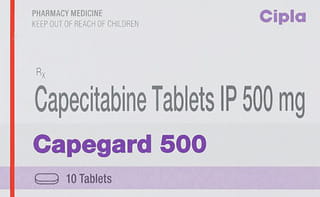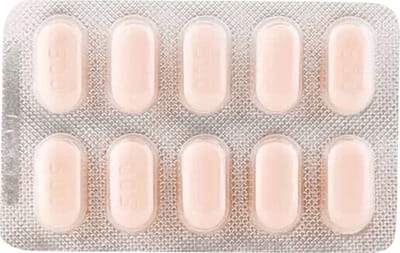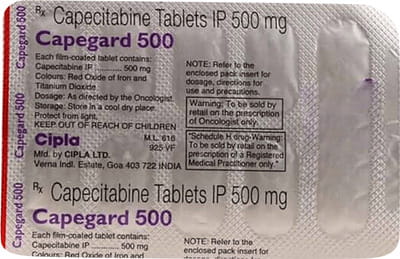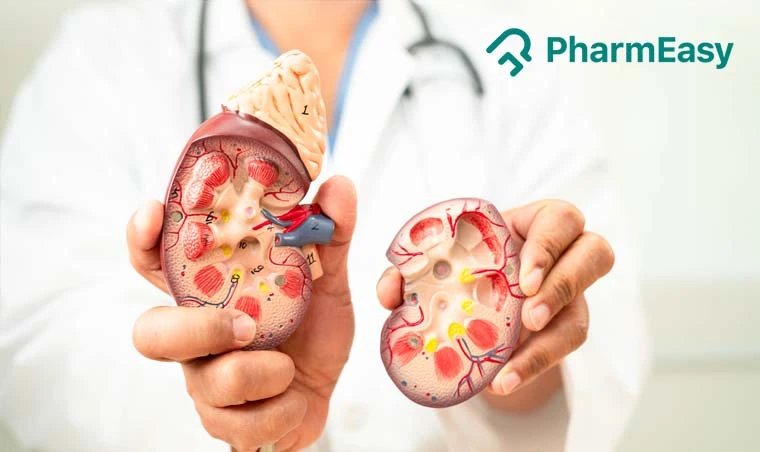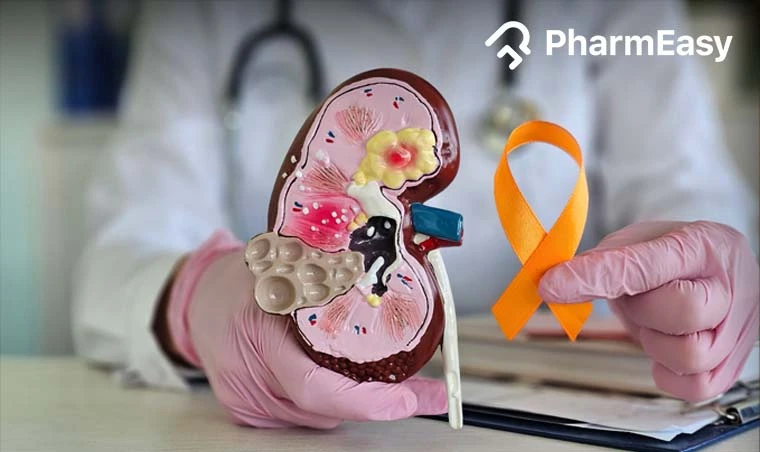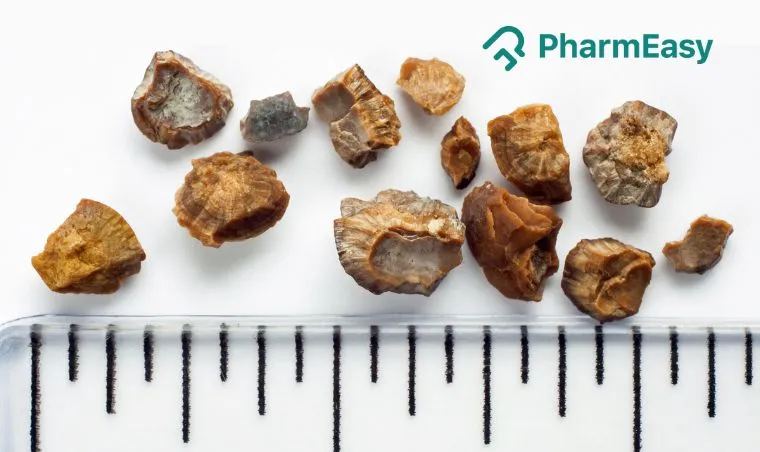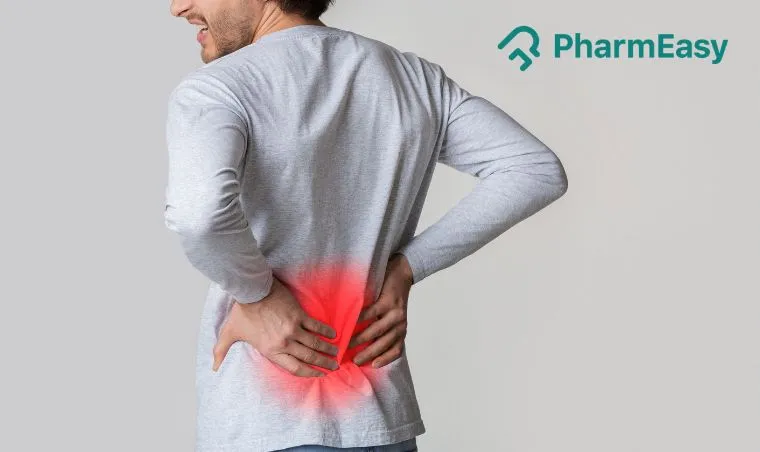Capegard 500mg Strip Of 10 Tablets
Description
Capegard 500 Tablet is an anticancer medicine used in the treatment of colorectal and breast cancer. It contains capecitabine as its active ingredient, which is converted into 5-fluorouracil in the body. This active compound works by interfering with the synthesis of RNA and DNA in cancer cells, thereby slowing their growth and ultimately contributing to their destruction. Capegard 500 Tablet is prescribed by doctors based on the type and stage of cancer, as well as the patient’s overall health.
This medication is typically administered orally in tablet form. It is important to follow your doctor’s instructions regarding the dosage, timing, and duration of treatment. Do not adjust the dose or stop taking Capegard 500 Tablet without consulting your doctor, as doing so may reduce its effectiveness and increase the risk of cancer progression. Regular monitoring by your healthcare provider is essential to assess the response to treatment.
Some patients may experience side effects while using Capegard 500 Tablet. Common side effects include nausea, vomiting, diarrhea, fatigue, loss of appetite, and mouth sores. Skin reactions, such as redness, peeling, or pain, may also occur on the palms and soles. Most side effects are manageable, but it is important to inform your doctor if they become severe or persistent.
Before starting Capegard 500 Tablet, inform your doctor about your complete medical history, including liver or kidney problems, heart conditions, or any prior allergic reactions. Also, share a list of all other medications, supplements, and herbal products you are taking, as some medicines may interact with Capegard and affect its safety or effectiveness. Pregnant or breastfeeding women should avoid this medicine unless specifically advised by their doctor.
To achieve the best results with Capegard 500 Tablet, it is recommended to maintain a healthy lifestyle during treatment. Eat a balanced diet, stay hydrated, and get adequate rest. Avoid alcohol and smoking, as they may interfere with treatment and recovery. Always attend your scheduled follow-ups for monitoring and report any unusual symptoms to your healthcare provider promptly to ensure safe and effective cancer management.
Product Summary
| Offer Price | ₹545.63 |
| You Save | ₹293.80 (35% on MRP) |
| Contains | Capecitabine(500.0 Mg) |
| Uses | Colorectal and breast cancer |
| Side effects | Diarrhoea Vomiting Nausea Stomatitis Abdominal pain |
| Therapy | ANTI-NEOPLASTIC |
Uses
Contraindications
- If you are allergic to capecitabine or any of the other ingredients of this medicine.
- If you previously have had severe reactions to fluoropyrimidine therapy (a group of anticancer
- medicines such as fluorouracil).
- If you are pregnant or breastfeeding.
- If you have severely low levels of white cells or platelets in the blood (leucopenia, neutropenia
- or thrombocytopenia).
- If you have severe liver or kidney problems.
- If you know that you do not have any activity of the enzyme dihydropyrimidine dehydrogenase
- (DPD) (complete DPD deficiency).
- If you are being treated now or have been treated in the last 4 weeks with brivudine as part of
- herpes zoster (chickenpox or shingles) therapy.
Side effects
- Diarrhoea
- Vomiting
- Nausea
- Stomatitis
- Abdominal pain
- Fatigue
- Asthenia
Precautions and Warnings
Pregnancy
Breast Feeding
Driving
Alcohol
Other General Warnings
- You know that you or your family member have a partial deficiency in the activity of the enzyme dihydropyrimidine
- dehydrogenase (DPD)
- You have liver or kidney diseases
- You have or had heart problems (for example an irregular heartbeat or pains to the chest, jaw
- and back brought on by physical effort and due to problems with the blood flow to the heart)
- You have brain diseases (for example, cancer that has spread to the brain, or nerve damage (neuropathy)
- You have calcium imbalances (seen in blood tests)
- You have diabetes
- You cannot keep food or water in your body because of severe nausea and vomiting
- You have diarrhoea
- You are or become dehydrated
- You have imbalances of ions in your blood (electrolyte imbalances, seen in tests)
- You have a history of eye problems as you may need extra monitoring of your eyes
- You have a severe skin reaction.
- Do not give Capegard to children and adolescents.
Directions for Use
- Take this medicine as a whole with sufficient water.
- Always take this medicine exactly as prescribed by your doctor.
- Do not consume more than the prescribed dose.
- Do not discontinue the medicine on your own without consulting your doctor.
Storage and disposal
Quick Tips
- Take the tablets exactly as prescribed; do not alter the dose without consulting your doctor.
- Complete the full course, even if you feel better, to ensure maximum effectiveness.
- Report any unusual side effects, such as severe diarrhea, mouth sores, or skin reactions, to your doctor.
- Avoid over-the-counter medications or supplements unless approved by your doctor.
- Store the tablets in a cool, dry place away from direct sunlight and out of reach of children.
Dosage
Overdose
Missed a Dose
Mode of Action
How Does It Work?
Interactions
Interactions with other medicines
- Some medicines can affect the way Capegard Tablet works, or Capegard Tablet itself can reduce the effectiveness of other medicines taken at the same time.
- Tell your doctor about all medicines, supplements, or herbals you are currently taking or might take to avoid any possible interaction.
- You must not take brivudine (an anti-viral medicine for the treatment of shingles or chickenpox) at the same time as Capegard Tablet.
Interactions with food items
- Take Capegard 500 Tablet within 30 minutes after a meal to reduce stomach upset.
- Avoid grapefruit or grapefruit juice, as it may affect how the medicine is absorbed.
- Limit alcohol intake, as it can worsen side effects like nausea, vomiting, and liver stress.
- Maintain a light, balanced diet to help manage diarrhea, nausea, or loss of appetite.
- Stay hydrated by drinking plenty of water throughout the day.
Content Details
Dr. Mansi Savla
B. Pharm, PharmD
Dr. Ritu Budania
MBBS, MD (Pharmacology)
Frequently Asked Questions (FAQs)
Q: What is the use of Capegard Tablet?
Q: What is the composition of Capegard Tablet?
Q: How does Capegard 500 Tablet work?
Q: What are the common side effects of Capegard 500 Tablet?
References
Did you find this medicine information helpful?
Please rate your experience
